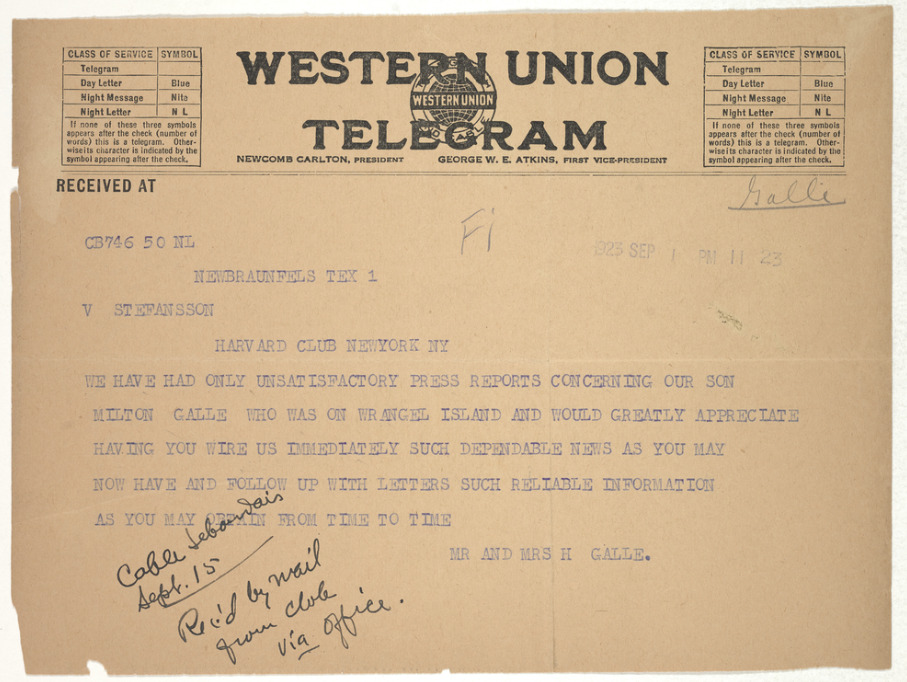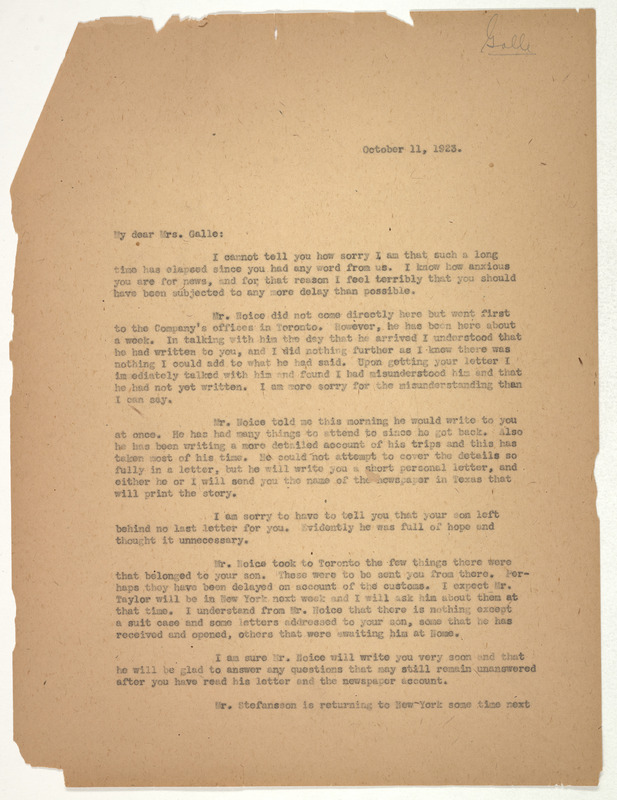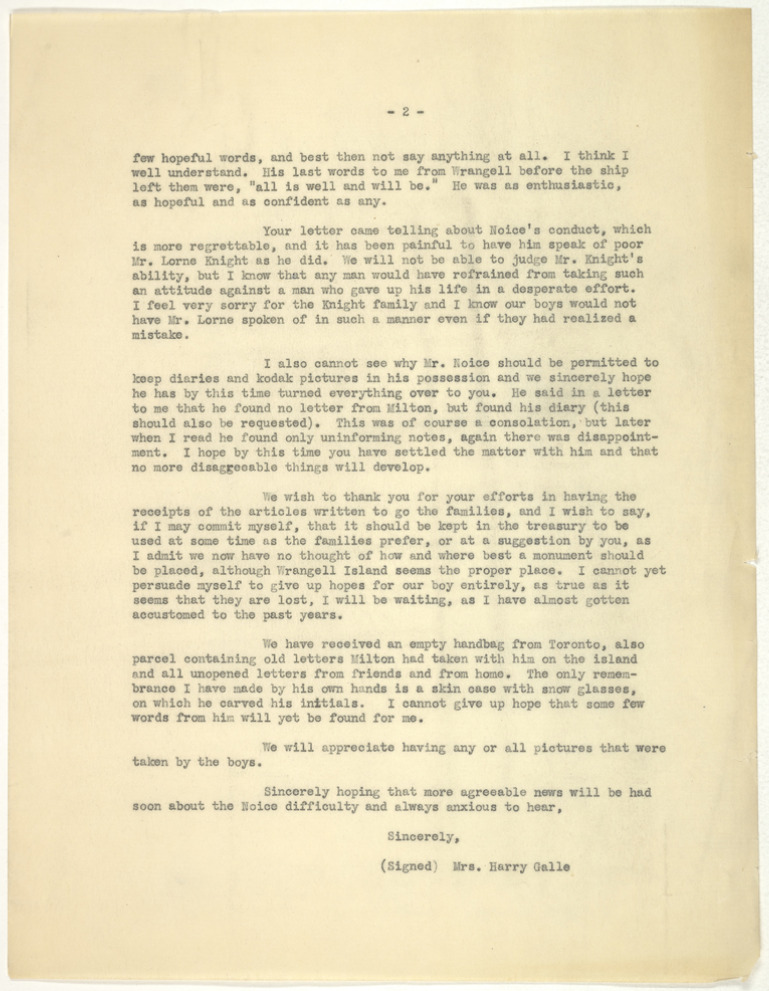Legacy of Milton Galle
Due to the shortage of food, Knight’s sickness, and the looming fear of starvation and death, Milton Galle left Wrangel Island on an expedition to Nome with Allan Crawford and Frederick Maurer on January 28th, 1923 in hopes to find more food and resources that can sustain them through the harsh Arctic conditions. The three left the site and were never seen again.
While the cause of their disappearances and deaths are unclear, news of it spread like wildfire. Newspapers seized upon the tragedy, sensationalizing what occurred on Wrangel Island. Crawford’s parents accused Stefansson for the deaths on the trip as their son was another young explorer on the trip. Maurer’s parents had a very different view on the death of their son, as he was a more experienced explorer and allowed for their son’s journals and diaries to be seen by the public. However, amidst the media frenzy, Galle’s story was overshadowed. There was very little press coverage about Galle’s family’s distress over his untimely death. Instead, the only glimpse of their grief lies within the letters and communication exchanged with Stefansson.
In a concerned telegram sent on September 1, 1923, over six months after Galle’s disappearance, the Galles reached out to Stefansson, expressing their concern and frustration with the unsatisfactory press reports about their son. Their desperate plea for any news or information about their son revealed the distress of parents seeking closure and understanding about their son.
“WE HAVE HAD ONLY UNSATISFACTORY PRESS REPORTS CONCERNING OUR SON MILTON GALLE WHO WAS ON WRANGEL ISLAND AND WOULD GREATLY APPRECIATE HAVING YOU WIRE US IMMEDIATELY SUCH DEPENDABLE NEWS AS YOU MAY NOW HAVE AND FOLLOW UP WITH LETTERS SUCH RELIABLE INFORMATION AS YOU MAY CONFIRM FROM TIME TO TIME”
- Mr. and Mrs. Galle
Mrs. Galle finally received a response on October 11, 1923. In this letter, the person who wrote it apologized for how delayed their response was and acknowledged how distressing this situation was. It was also indicated that Milton did not leave behind a letter for his parents as he probably believed there was no reason to. The person wrote,
“I am sorry to have to tell you that your son left behind no last letter for you. Evidently he was full of hope and thought it unnecessary.”
This further implies how Milton did not realize how dangerous this expedition was as he did not think he would even need to prepare one.
In a subsequent letter on November 6, 1923, Mrs. Galle revealed an understanding of their son’s death to Stefansson. Initially, reading Stefansson’s book “The Friendly Arctic” provided comfort, believing that their son and his companions were doing well in the Arctic. However, the distressing news about the conditions that her son and his companions were experiencing challenged Stefansson’s false vision of what the Arctic is. The Galles struggled to comprehend why the expedition did not have enough resources and supplies, especially due to the island’s inaccessibility, revealing how Stefansson ill-prepared the explorers. In addition, Mrs. Galle revealed that Milton assured her before leaving for Wrangel Island, stating
“all is well and will be.”
- Milton Galle
Mrs. Galle’s letter to Stefansson on December 29, 1923 revealed her heartbreak for her child. This letter was in reply to Stefansson’s letter comforting the Galles about Milton’s disappearance. She was relieved that there was some sort of writing by Milton that she and her husband could hold onto but are confused as to why these items are kept with Mr. Noice. They stated that his actions add unnecessary distress to the families who were impacted. It was also indicated in the letter that she did not know what role Milton played in the expedition. She discussed the profound impact of losing Milton, expressing her regret over his departure as such a young explorer. She wrote,
“Milton was taken from us, makes such a change in our lives, from which we will never recover entirely and as parents will do, we regret that he went as young as he was,”
- Mrs. Galle
indicating that had Milton not been taken advantage of by Stefansson, his life would have been very different.
Milton’s legacy, although overlooked and even forgotten by headlines, shows a young explorer who was exploited by Stefansson’s ambitions. All of these explorers were ill-equipped, even the most experienced ones, and as young as Milton was, it was clear that Milton was taken advantage of. Though modest in its public knowledge, his story resonates profoundly with his family, forever ingrained in the quiet despair captured in the communication between his parents and Stefansson.
Bibliography
stefansson-wrangel-09-18-015-001
stefansson-wrangel-09-18-016-001
stefansson-wrangel-09-18-020-001
stefansson-wrangel-09-18-025-006
Webb, Melody. "Arctic Saga: Vilhjalmur Stefansson's Attempt to Colonize Wrangel Island." Pacific Historical Review 61, no. 2 (May 01, 1992): 215. https://www.proquest.com/scholarly-journals/arctic-saga-vilhjalmur-stefanssons-attempt/docview/1290888302/se-2.




